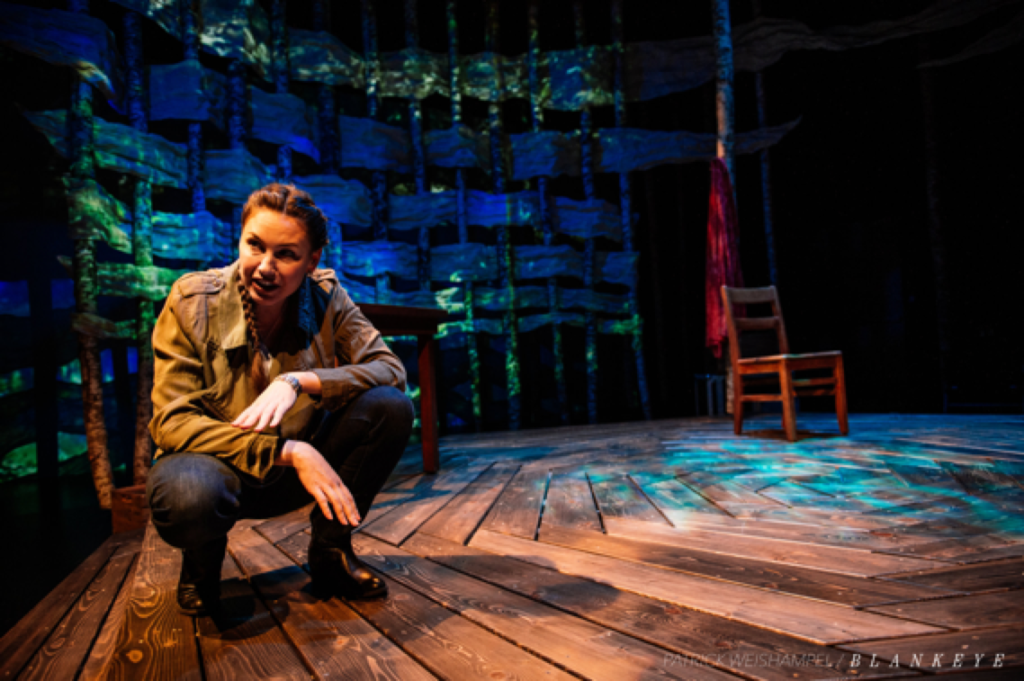
“And So We Walked”, by DeLanna Studi. Directed by Corey Madden. Produced by Octopus Theatricals. Presented by Arts Emerson, Emerson Paramount Center, 559 Washington Street, Boston through April 30.
by Michele Markarian
“A true story is dangerous. Even if you’re the best storyteller, you can’t run from the truth”. Thus begins DeLanna Studi’s moving and personal take on her and her father’s six-week sojourn on the Trail of Tears, following the footsteps of their Cherokee ancestors, who were forced into relocation during the 1830s. During the course of the two-and-a-half-hour show, many intimate and historical truths are revealed as Studi weaves her personal narrative alongside that of the Cherokee Nation.
We are first introduced to Studi’s imposing father who insists on accompanying her to school so that she can confront the first-grade teacher who tells her that “Indians are extinct”. Her father was raised in a boarding school for Native Americans, famous for its motto of “Kill the Indian and save the man”. He was taught to unlearn all that he’d been raised with. It wasn’t until the 1978 American Indian Religious Freedom Act passed that Native Americans were allowed to practice their traditional dances and ceremonies.
At least 4000 Cherokee died during the Trail of Tears, when 16,000 Cherokees were forced from their land to make the trek to Oklahoma, designated “Indian Territory.” They were first held in concentration camps, or “immigration depots,” as a clueless guide at Fort Butler tells Studi and her father. The conditions in the camps were crowded and unsanitary, spreading disease among the Cherokee. Like anyone who carries generational trauma, Studi’s response to the trail is visceral – she holds the pain of her ancestors deep inside of her body, in ways she doesn’t always recognize or understand. Her grandmothers haunt her dreams. When she discovers that some of her relatives who’d been living in North Carolina were wealthy owners of land and slaves, she is stunned. “How do I reconcile that my family was both victim and victimizers?’ she asks, pained.
Studi is an excellent actress and storyteller. She does such a credible job creating the vocal qualities and mannerisms of other characters that you forget it’s a one-woman show. Indeed, the most poignant and unforgettable character is that of her father, who comes out of himself when he’s among the Cherokee and is allowed to reclaim the parts of him that were forced into hiding at boarding school. He is also protective of his daughter, particularly as she’s involved with a man that everyone but she knows isn’t worth it. Studi’s reaction to her father’s popularity on the trek, which is really her project, is hilarious. Like all good storytellers, Studi knows when to insert humor.
“I learned so much I didn’t know,” said my companion on the train ride home. While I can’t hear the word reparations without thinking about the Native Americans, I had no idea just how complicated and painful their history is – the betrayals amongst themselves, the betrayals by our government, the fact that the Cherokees were never paid the five million dollars that they sold their land for under the Treaty of New Echota. Studi also introduces us to the legend of Spearfinger, a Cherokee shapeshifter whose hunger always consumed her happiness, a ghost whom Studi must expel from her own psyche as she faces her demons in order to move forward. For anyone seeking a deeper story of the land we live on, and the land within ourselves. For tickets and information, go to: https://artsemerson.org/

